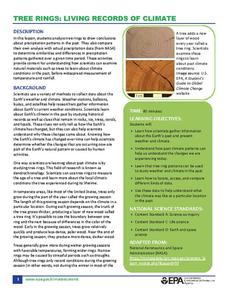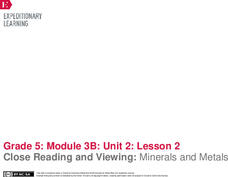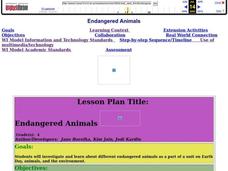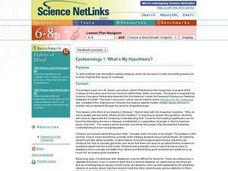Curated OER
Exploring Arizona's Biotic Communities Lesson 2: Biotic Communities Vocabulary
Part of a unit on Arizona's biotic communities, this activity focuses on the vocabulary to be used. Terms include biodiversity, topography, desert, hybridization, niche, and more! Youngsters will define these words from contextual...
Curated OER
Mystery Boxes: Uncertainty and Collaboration
Students manipulate boxes with unknown internal structure and contents to become familiar with the concept of uncertainty in science.
Curated OER
Where is Shirley the Elephant?
Young animal lovers engage in a lesson that's all about elephants. They access an elephant sanctuary website and read a story about Shirley the elephant. They perform a series of activities based upon that story, and also study about the...
Curated OER
Archaeology
Students compare and contrast the role of scientists with that of archaeologists. They also describe the roles of observations and evidence in science.
Curated OER
Artifacts 2: Artifacts in Context
Young scholars will explore an archaeological mystery that demonstrates the importance of context in learning from artifacts. Factors such as the artifact's location, its proximity to other artifacts, and the number of similar artifacts...
US Environmental Protection Agency
Tree Rings: Living Records of Climate
Open with a discussion on weather and climate and then explain how tree rings can provide scientists with information about the earth's past climate. Pupils analyze graphics of simulated tree rings from various US locations for the...
Curated OER
Phineas Gage: Notecard Vocabulary Strategy
Understanding the vocabulary in a text, especially a text like Phineas Gage: A Gruesome but True Story About Brain Science that includes quite a few technical terms, can be the key to understanding the text as a whole. Learners focus on...
EngageNY
Close Reading and Viewing: Minerals and Metals
How easy is it to live off the land? Scholars read Minerals and Metals in Your Life and discuss how Canada's natural resources meet the needs of the people. Pupils watch a brief video and discuss the gist of the text and video. They then...
Curated OER
Women's Brains
Pupils experience an example of bias in science dealing with women and gender.
Curated OER
Artifacts 1: What Can We Learn From Artifacts?
Sixth graders are introduced to artifacts and explore an online archaeological site to connect clues about how people once lived. In this deductive reasoning instructional activity, 6th graders participate in the stratigraphy game on...
Curated OER
Technology and Oil
Young scholars demonstrate how much our society depends on petroleum products. They show how advances in technology have allowed us to find, obtain, and transport oil more efficiently.
Curated OER
Gray Whales
Explore the majestic grey whale while deepening your understanding of animal adaptations. Grey whales from head to toe are specifically designed to fit their environment. Learners will examine the ways in which the flippers, head, body,...
Curated OER
My Senses Tell Me...
Students explore how to use their sense to draw conclusions. In this human biology instructional activity, students use their senses to observe various objects in learning centers. The centers include tasting salt, touching sandpaper,...
Curated OER
Endangered Animals
Fourth graders research different endangered animals in media center as part of unit on Earth Day, animals, and environment, create project based around multiple intelligence related to an endangered animal, and produce Powerpoint...
Curated OER
Nocturnal vs. Diurnal Animals
First graders identify nocturnal and diurnal animals. In this animal instructional activity, 1st graders discuss the differences between animals that are active during the day and those that are active at night. Students write summaries...
Curated OER
What Can I Do?
Students identify how they are feeling and deal with feelings constructively. In this conflict resolution lesson plan, students explore their feelings through discussion. Students read and complete the What Can I Do? e-sheet. Students...
Curated OER
Weathervanes in the Wind
Students investigate wind and weather by creating a weathervane. In this environment lesson, students identify the purpose of a weathervane and observe weathervanes in action on their campus. Students create a weathervane and decorate...
Curated OER
What Can We Learn from Artifacts?
Students examine how artifacts are discovered and explore their significance as it pertains to gathering important information. In this artifacts lesson, students obtain knowledge about the way artifacts are excavated and examine an...
Curated OER
Epidemiology 1: What's My Hypothesis?
Middle schoolers demonstrate how descriptive epidemiological clues can be used to make educated guesses as to what might be the cause of a disease.
Curated OER
Flight of the Future/Space Flight
Learners explore space science by viewing videos on YouTube. In this moon landing lesson, students view clips of Neil Armstrong taking his first step on the moon and discuss the space race between the U.S. and Russia. Learners utilize...
Curated OER
Look At Those Leaves!
Students observe leaves and their attributes and group them accordingly. In this science observation activity students gather leaves and use them to become more familiar with seasonal changes and the cycles of our environment.
Curated OER
Skin Cancer Prevention
Learners explore ways to prevent skin cancer. Using activities, students explore suggestions on protecting skin. Learners report their findings to the class. They discuss events in their personal lives and changes they should make to...
Curated OER
Skin Cancer Prevention
Students discuss skin cancer prevention. In this skin cancer lesson, students read a pamphlet that tells the causes of skin cancer and what you can do to prevent it. Students will choose from a variety of projects which focus on skin...
Curated OER
Those Cells Look Good Enough to Eat
Young scholars explore the parts of the cell. In this cell lesson, students use foods to create cell models that represent the nucleus, cytoplasm, cell membrane, mitochondria, ribosomes, vacuoles, endoplasmic reticulum, and Golgi bodies...

























